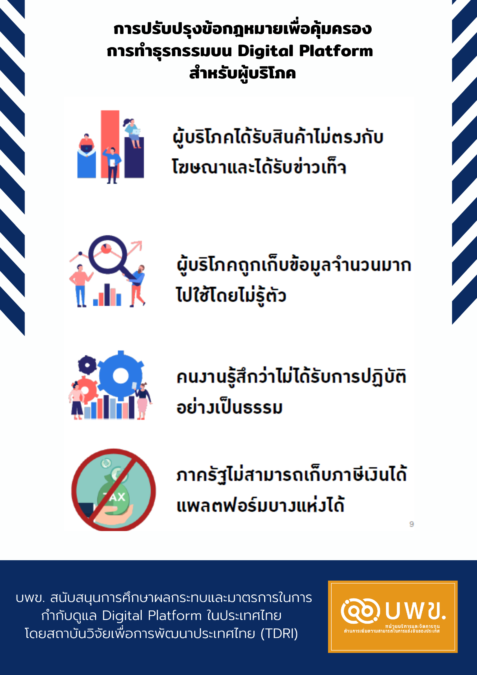On 11 November 2022 : Presentation of results of the study on the impact and measures to regulate the Digital Platform in Thailand by the Thailand Development Research Institute (TDRI) to support the Digital Platform businesses, which are increasing significantly in number and market value at present time, including a service matching business such as between taxi services and passengers, or between stores and buyers, etc.
In 2022, it was found that the value of goods and services traded was as high as 1.3 trillion baht, which contributed to the overall national economy, and having a significant impact on businesses and consumers alike. At the same time however, the digital platform business still has limitations and obstacles that may affect trading partners in conducting transactions. Therefore, there must be a regulatory approach or amendments to the law to make it more fair to all parties and can truly benefit the economy. Along with presenting the results of the study on the regulatory measures for digital platform business, the TDRI also proposed improvements to 5 specific laws and regulations.

Proposition #1: Enact an ex-ante approach similar to the Digital Market Act devised by the EU to reduce the limitations of the ex-post approach in the previous laws that is too slow for platform businesses, which have the tendency to be more clustered in nature.
Proposition # 2: Enact a law to protect platform users, similar to the EU’s Digital Service Act, by defining the duties and responsibilities of platform providers in order to prevent misconduct by merchants and users on the platform, such as requirement to fully identity the merchants, as well as to prevent new risks posed by the platform itself, for example ads specifically targeting vulnerable demographics are prohibited.
Proposition #3: Quickly establish the development of guidelines for the promotion of personal data protection and repealing bills that would preclude the enforcement of Personal Data Protection Act (PDPA).
Proposition 4 : Enact a law to protect employees of platforms by setting minimum protection measures, such as setting up a mechanism to encourage platforms to compete to increase protection, establishing criteria for proving the legal status of “employees”, and supervising those with authority to determine working conditions, etc.
Proposition # 5: Join the OECD Pillar I & II Tax Partnership and amend the revenue code to collect income tax with platforms that do not have an office in Thailand.














